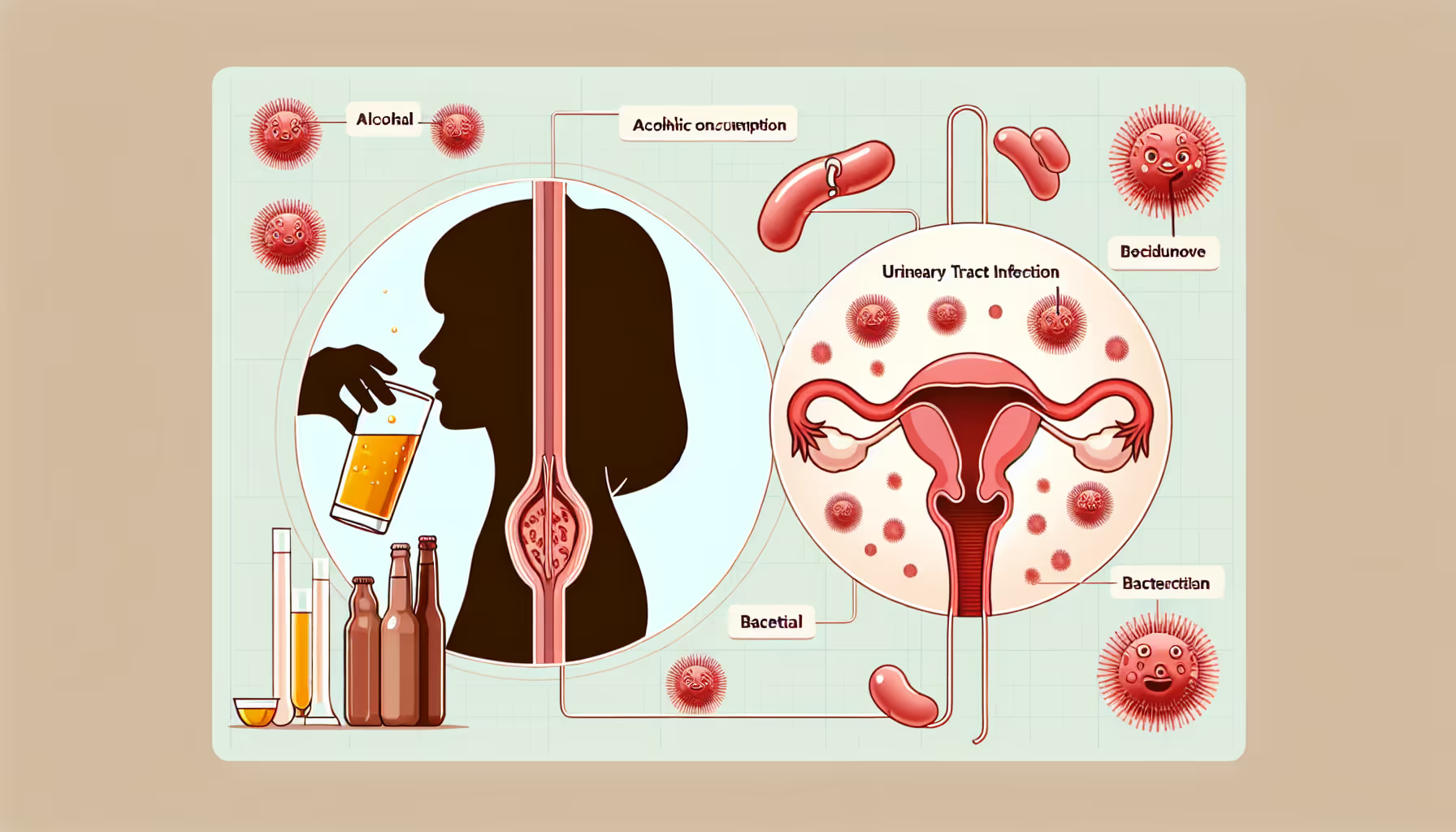Alcohol and UTI's - Can Alcohol Consumption Cause UTI

Alcohol Consumption and UTIs
Understanding the correlation between alcohol consumption and urinary tract infections (UTIs) is crucial for people who frequently consume alcohol and are concerned about their health status. This section will detail what UTIs are and how alcohol can impact their occurrence and severity.

Understanding UTIs
Urinary tract infections are common in both men and women, but women are at a higher risk due to having a shorter urethra. This anatomical difference makes it easier for bacteria to travel to the bladder, increasing the chances of infection. Postmenopausal women are particularly susceptible to UTIs due to low estrogen levels, which change the vaginal and urethral tissue [1].
Impact of Alcohol on UTIs
While alcohol itself does not directly cause UTIs, excessive alcohol consumption can contribute to factors that increase the risk of developing UTI symptoms, such as dehydration and a weakened immune system. Alcohol acts as a diuretic, increasing urine production and potentially flushing out beneficial bacteria in the urinary tract. This disrupts the natural balance of bacteria, making it easier for harmful bacteria to cause infection [2].
Furthermore, alcohol can weaken the immune system, making an individual more susceptible to UTIs and potentially prolonging the duration of symptoms. The immune system suppression can last up to 24 hours after consuming 5-6 drinks in a single session, regardless of regular drinking habits.
Long-term alcohol consumption can also lead to a longer recognition and response time of infections by the immune system, increasing susceptibility to infections over time [3]. Furthermore, alcohol's diuretic effect can further dehydrate the body, worsening UTI symptoms such as frequent urination and burning sensations. Its impact on the immune system can hinder the body's ability to fight off the infection.
By understanding the impact of alcohol on UTIs, individuals can make informed decisions about their alcohol consumption levels and how they can best reduce their risk of developing these infections.
Mechanisms of Alcohol-Related UTIs
To fully understand the query, "can alcohol consumption cause UTIs?," it's important to look at the mechanisms through which alcohol can potentially contribute to the development of urinary tract infections (UTIs). Two primary pathways include dehydration and the impact on the immune system.
Dehydration and UTIs
Excessive alcohol consumption often leads to dehydration, a condition that can concentrate the urine. The concentrated urine can potentially irritate the bladder, paving the way for the development of a UTI.
Moreover, alcohol acts as a diuretic, increasing urine production. This can potentially flush out beneficial bacteria in the urinary tract, disrupting the natural balance of bacteria. With less of the 'good' bacteria, it becomes easier for harmful bacteria to cause an infection.
Additionally, the diuretic effect of alcohol can further dehydrate the body, worsening UTI symptoms such as frequent urination and burning sensations.
Immune System and UTIs
Alcohol's impact on the immune system plays a significant role in making an individual more susceptible to UTIs. It can weaken the immune system, potentially prolonging the duration of symptoms.
Short-term effects of alcohol include suppressing the immune system for up to 24 hours after consuming 5-6 drinks in a single session, regardless of regular drinking habits. This leaves individuals vulnerable to infections and diseases [3].
Long-term alcohol consumption can lead to a longer recognition and response time of infections by the immune system, increasing susceptibility to infections over time. This effect is particularly concerning as it hinders the body's ability to fight off the infection.
Additionally, alcohol can impact the immune cells that protect the lungs, damage lung tissue, and weaken lung function, making individuals 3-7 times more vulnerable to serious conditions like pneumonia arising from common respiratory tract infections.
Alcohol can also affect the 'good' bacteria in the gastrointestinal (GI) tract necessary for healthy immune function, impacting the immune system negatively. Furthermore, it can affect the cells lining the GI tract, which is linked to the development of alcohol liver disease.
Given these mechanisms, it's essential to limit alcohol intake to lower the risk of alcohol affecting the immune system. For example, Australians are recommended to drink no more than 10 standard drinks per week, with no more than 4 drinks on any single occasion.
Alcohol's Effect on UTI Symptoms
The relationship between alcohol consumption and urinary tract infections (UTIs) has been the subject of much debate. While alcohol itself does not cause UTIs, it can exacerbate the symptoms and prolong the infection.
Bladder Irritation
Alcohol consumption may lead to bladder irritation, which can consequently worsen the symptoms of a UTI. This is because alcohol increases the acidity of urine and impacts the body's ability to fight infections.
Moreover, alcohol can interfere with the effectiveness of antibiotics prescribed for UTIs. Mixing alcohol with these medications can lead to side effects such as drowsiness and upset stomach, further complicating the situation [4].
Frequency of Urination
Alcohol is a diuretic, which means it increases the frequency of urination. This can have two significant impacts when it comes to UTIs. Firstly, the increased urination can lead to dehydration, which, in turn, irritates the bladder and causes symptoms such as pain and burning during urination.
Secondly, the increased urine production can potentially flush out beneficial bacteria in the urinary tract. This disruption of the natural balance of bacteria in the urinary tract makes it easier for harmful bacteria to cause an infection.
In essence, while alcohol consumption does not directly cause UTIs, it can significantly aggravate the symptoms and make the infection more difficult to treat. Consequently, it is advisable for individuals suffering from a UTI to limit their alcohol intake until the infection has fully cleared.
Preventing UTIs with Alcohol Consumption
Alcohol consumption, particularly in excess, can potentially lead to urinary tract infections (UTIs). However, there are ways to prevent UTIs even when alcohol is consumed occasionally.
Limiting Alcohol Intake
Excessive alcohol consumption can result in a weakened immune system, leaving an individual more susceptible to UTIs. According to the Alcohol and Drug Foundation, consuming 5-6 drinks in a single session can suppress the immune system for up to 24 hours, regardless of one's regular drinking habits. This implies that even occasional bouts of heavy drinking can leave the body vulnerable to infections.
Therefore, limiting alcohol intake is crucial. It is recommended that individuals drink no more than 10 standard drinks per week, with no more than 4 drinks on any single occasion to lower the risk of alcohol affecting the immune system [3].
Hydration Practices
Alcohol acts as a diuretic, increasing urine production and potentially disrupting the natural balance of bacteria in the urinary tract. This can make it easier for harmful bacteria to cause infection [2]. Additionally, the diuretic effect of alcohol can further dehydrate the body, worsening UTI symptoms such as frequent urination and burning sensations.
Therefore, maintaining hydration is key when consuming alcohol. This can help counteract the dehydrating effects of alcohol and dilute the urine, reducing the potential for bladder irritation and UTI development. Drinking plenty of water and non-alcoholic fluids can help to keep the urinary tract functioning properly and prevent the onset of a UTI.
In conclusion, while alcohol consumption can potentially lead to UTIs, these risks can be mitigated through responsible drinking habits and proper hydration. By limiting alcohol intake and ensuring adequate hydration, individuals can enjoy a drink without significantly increasing their risk of developing a UTI.
Gender Differences and UTI Risk
The risk of urinary tract infections (UTIs) can vary significantly between genders due to anatomical and physiological differences. This section will delve into the specifics of how alcohol consumption may influence UTI risk in women and men.
Women and UTIs
UTIs are common in women, with many experiencing more than one UTI during their lifetimes. Risk factors specific to women include female anatomy, including the closeness of the anus to the urethra and the bladder opening, making it easier for bacteria to enter the urinary tract.
Women are at greater risk for a UTI due to having a shorter urethra, which makes it easier for bacteria to travel to the bladder. UTIs are also more common in postmenopausal women due to low estrogen levels changing vaginal and urethral tissue.
About half of people assigned female at birth (AFAB) will have a UTI at some point during their lives, and healthcare providers treat 8 million to 10 million people each year for UTIs.
Men and UTIs
While men can also contract UTIs, their risk is generally lower due to their longer urethra. However, certain lifestyle factors, including alcohol consumption and smoking, can influence a man's risk of urinary tract symptoms.
Interestingly, a study among Korean men found that alcohol consumption is associated with a decreased risk of having severe lower urinary tract symptoms (LUTS), while cigarette smoking is associated with an increased risk.
Men who drank alcohol at least once per month were significantly associated with a decreased risk of having severe LUTS. On the other hand, past smokers and daily smokers showed a significantly increased risk of having severe LUTS.
It's important to note that these findings do not suggest that alcohol is protective against UTIs or that smoking is a direct cause. Rather, they highlight the complex interplay between lifestyle factors, gender differences, and UTI risk.
In summary, while both men and women can develop UTIs, the risk is significantly higher in women due to anatomical differences. Alcohol consumption and smoking can also influence the risk of UTIs and LUTS, underscoring the importance of lifestyle factors in managing and preventing these conditions.
Lifestyle Factors and UTI Prevention
While the impact of alcohol on urinary tract infections (UTIs) is significant, other lifestyle factors also play a crucial role in UTI prevention. These factors include physical activity and smoking cessation.
Physical Activity
Physical activity is associated with a lower likelihood of developing lower urinary tract symptoms (LUTS), which include UTIs. According to research, low physical activity was associated with a 2-3 times higher likelihood of LUTS development.
For women, the influence of physical activity on UTIs is particularly significant. Women with high physical activity were 68% less likely to develop LUTS compared to those with low activity. No association was observed between activity and storage symptoms in women.
In the case of men, light-to-moderate drinking (<1 alcoholic drink/day) increased the likelihood of LUTS. It's essential to note that the link between physical activity and UTI prevention is not solely about reducing alcohol consumption, but also about maintaining overall health and immune function.
Smoking Cessation
Another lifestyle factor crucial for UTI prevention is smoking cessation. Research indicates that smoking may contribute to LUTS development in women, but not men. Women who were current smokers were over twice as likely to develop storage symptoms compared to never smokers.
In the context of alcohol consumption, among women, drinkers were half as likely to develop storage symptoms and three times as likely to develop voiding symptoms when consuming 1+ drinks/day. This indicates a complex interaction between smoking, alcohol consumption, and UTIs.
As part of UTI prevention strategies, certain lifestyle factors, particularly low physical activity and smoking cessation, may be recommended. By paying attention to these factors, individuals can not only reduce their risk of UTIs but also improve their overall health and well-being.
References
[2]: https://www.townsendla.com/blog/alcohol-cause-uti
[3]: https://adf.org.au/insights/alcohol-immune-system/
[4]: https://www.healthline.com/health/urinary-tract-infection-adults/alcohol-and-uti
[5]: https://www.mayoclinic.org/diseases-conditions/urinary-tract-infection/symptoms-causes/syc-20353447
[6]: https://my.clevelandclinic.org/health/diseases/9135-urinary-tract-infections
You’re not alone in this.
When mental health challenges and addiction intersect, it can feel isolating. At Arista, we offer compassionate, evidence-based, and trauma-informed care to help you heal, grow, and move forward.
You’re not alone in this.
When mental health challenges and addiction intersect, it can feel isolating. At Arista, we offer compassionate, evidence-based, and trauma-informed care to help you heal, grow, and move forward.
Support that moves with you.
You’ve taken a brave first step. At Arista Recovery, we’re here to help you continue with best-in-class care designed for long-term healing and support.
.webp)






